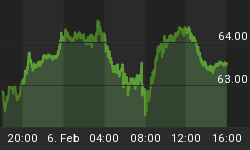Bitcoin holders -- especially those who bought in during the crypto-currency's recent surge past $1,000 -- are a bit shell-shocked this week:
Bitcoin prices plunge as problems persist
Bitcoin prices plunged again Monday morning after Mt.Gox, the major exchange for the virtual currency, said technical problems require it to continue its ban on customer withdrawals.Mt.Gox said it has discovered a bug that causes problems when customers try to use their account to make a transfer or payment of bitcoins to a third party. It said the problem is not with Mt.Gox software but affects all transfers of bitcoins to third parties.
The exchange said it was suspending withdrawals and third-party payments until the problem is fixed, although trading in bitcoins continues.
A bug is allowing a third party receiving a bitcoin transfer to make it look as if the transfer did not go through, which can lead to improper multiple transfers, Mt.Gox said.
Bitcoin prices on Mt.Gox plunged from about $693 just early Monday to $510 at 6 a.m. ET, soon after the statement was posted. Prices had been as high as $831 just after 7 p.m. Thursday before Mt.Gox's halt of withdrawals was first disclosed early Friday morning.
Mt.Gox tried to put the best face on the technical problems in its latest statement, noting that the technology is "very much in its early stages."
"What Mt.Gox and the Bitcoin community have experienced in the past year has been an incredible and exciting challenge, and there is still much to do to further improve," it said.
This is one of those "teaching moments" that the President likes to point out. But the lesson isn't that bitcoin in particular or crypto-currencies in general are fatally flawed. It is that they are currencies, not money or investments, and the differences between these three concepts is crucial to doing asset management right.
An investment is something that, if successful, generates cash flow and potentially capital gains, but if less successful can produce a capital loss. Money, in contrast, is capital. It is what you receive when you sell an investment and/or where you store the resulting wealth until you decide to buy something with it. Money does not generate cash flow and does not "work" for you the way an investment does. Instead, it preserves your capital in a stable form for later use.
"Sound" money exists in limited quantity and doesn't have counterparty risk - that is, its value doesn't depend on someone else keeping a promise - so it tends to hold its value over long periods of time. Gold and silver, for instance, have functioned as sound money for thousands of years. As you've no doubt heard many times, the same ounce of gold that bought a toga in ancient Rome will buy a nice suit today. Ditto for oil, wheat and most of life's other necessities.
Currency, meanwhile, is the thing we use for buying and selling. It can also be money, as in past societies where gold and silver coins circulated. But it doesn't have to be. Paper dollars, euro, and yen are representations of wealth rather than wealth itself and are only valuable because we trust the governments managing them to control their supply and banks to give us back our deposits on demand. Such currencies are not very safe but are extremely convenient, so even people who understand the inherent flaws of today's currencies keep some around for transacting.
As for bitcoin, for a while the more excitable in the techie community seemed to think that crypto-currencies could function not just as currency but as money, i.e., as a form of savings, because the supply of bitcoin was limited by the algorithm that creates it. But they were overlooking counterparty risk. Since the vast majority of bitcoins in circulation are stored electronically and transmitted over the Internet, they're only valuable if those media function correctly. Let a system fail, as Mt. Gox apparently has, and the bitcoins in that system are either unavailable (in which case their immediate value is zero) or suddenly very risky, in which case they're obviously not a good savings vehicle.
Is this a deal-breaker for crypto-currencies? No. In many ways bitcoin is a better currency than the dollar because it can't be inflated away by a desperate government or confiscated in the coming wave of bank bail-ins.
People who understand crypto-currencies and own a small amount of bitcoin for transactional purposes are probably unfazed by the latest speed bump. And people who had their life savings in it have received a valuable lesson in the nature of money.















